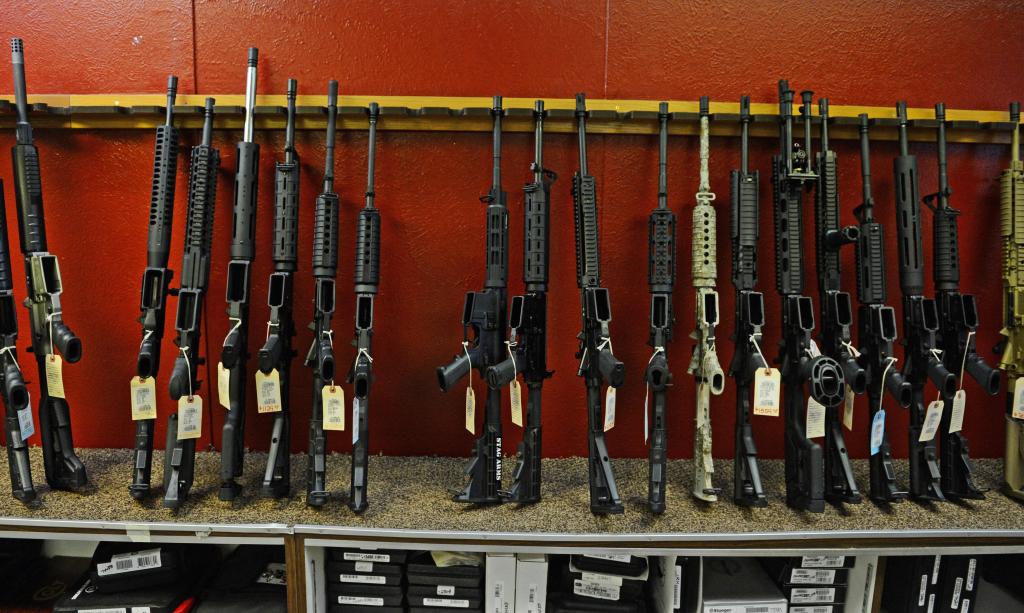World News
Colorado House passes bill to ban sale and purchase of ‘assault weapons’

For the first time in Colorado history, House Democrats have passed a bill Sunday to ban the sale, purchase and transfer of so-called “assault weapons.” in the state, putting the measure on a collision course with the Senate.
House Bill 1292 passed on a 35-27 vote, two votes past the threshold needed to pass. All of the supporters were Democrats, although nine Democrats joined House Republicans in opposition.
Under the measure, which was initially approved by the House on Friday, “assault weapons” are defined such as certain high-powered, semi-automatic rifles and pistols that have large-capacity fixed magazines or the ability to accept detachable magazines, along with various other features and types of high-powered firearms.
The bill does not prohibit the possession of weapons. Under a change made Friday, a person who illegally sells any of the covered firearms would face a $750 fine. Gun shops that violate the law risk losing state licenses that lawmakers are trying to implement under a separate bill being considered this session. House Bill 1353. A third bill set aside money to improve state investigations into illegal sales and other gun crimes.
The measure, backed by Denver Democratic Reps. Tim Hernández and Elisabeth Epps, now heads to the Senate, where it faces an uncertain path forward amid opposition from some Democrats and skepticism from Gov. Jared Polis. But a year after a similar bill failed at the first hurdle, even House passage is a milestone for a policy that some Colorado Democrats have long seen as a time-consuming distraction from other, more meaningful reforms.
Its passage is also a further sign of Colorado Democrats’ broader embrace of gun reform, 11 years after a ban on high-capacity magazines prompted election recalls and left lasting scars on Democratic policymakers.
House Democrats presented the ban as a preemptive response to the mass shootings that have become a routine and grim feature of American life, marring Colorado’s schools, grocery stores, movie theaters, nightclubs and public spaces. Several lawmakers represent areas that have become infamous for their own carnage over the past decade. Rep. Jennifer Bacon, a Democrat from Denver, said she had students at the Aurora movie theater during the 2012 shooting. One of them was shot.
She rejected Republican arguments that more guns would lead to crime prevention.
“The answer can’t be, ‘I need to get my gun so that if someone shoots me in church, I can shoot them back,'” Bacon said. “The answer can’t be, ‘When I go to the grocery store, I need my gun so I can shoot them.’ That is not prevention. That is reaction.”
Republicans in the House of Representatives unanimously opposed the bill. Democratic leaders limited floor debate to five hours Friday in an effort to curtail Republican filibustering. Some Republican lawmakers wore gun pins on their lapels, and two vowed that they or their constituents would not enforce the ban if it became law. Rocky Mountain Gun Owners, the pro-gun rights group, has already vowed to file a lawsuit if the bill passes.
In a preview of the lawsuits to come, several Republicans said the bill violates the Second Amendment. (A federal court in Illinois upheld that state’s sales and purchase ban, on which the Colorado bill is based; this ruling was appealed to the U.S. Supreme Court). They argued that the bill would not reduce gun violence because few people die in mass shootings compared to the daily violence that is often perpetuated with handguns.
Rep. Ryan Armagost, a Republican from Berthoud, called mass shootings “clickbait.” Others pointed to the frequent pro-gun talk that mental health issues, not access to firearms, were the true cause of America’s mass shooting epidemic.
“No matter what you ban, no matter what we take from citizens, criminals – people who hate – will always find a way to commit their evil deeds,” said Parker Representative Anthony Hartsook. “Nothing has stopped them since the beginning of time.”
Despite Democrats’ majority in the House of Representatives, the bill’s passage was not assured, and proponents were still affirming and expanding support Saturday evening, in part because a few supportive lawmakers were absent Sunday.
The bill’s sponsors and supporters in the Capitol have also repeatedly sidestepped potential pitfalls. The measure was amended in committee to eliminate its harsh civil penalties, diverting the bill from a potentially dangerous vote in the House Finance Committee and instead sending it to the full House.
Then on Friday, a group of Democrats joined House Republicans to amend the bill to include an investigation into the causes of mass shootings. Because that change would have required state money to finance it, the bill was vulnerable to referral back to committee, delaying further action and setting it up for a potentially fatal vote. The bill’s supporters rushed to shore up support to repeal the amendment, which they successfully did before the House broke Friday evening.
That set the stage for Sunday’s final vote, which came six days before the 25th anniversary of the 1999 Columbine shooting, which marked the start of the recent era of mass shootings. Shortly before the vote, Hernández spoke about the students and staff who died in that shooting. He became emotional as he described teacher Dave Sanders, who was killed in the shooting.
“I ask us, colleagues, never to forget, as begged by community members, relatives and children themselves for 25 years and every year since,” he said. “I ask you to never forget Kyle (Velasquez), Isaiah (Shoels), Cassie (Bernall) and a teacher named Dave.”
Next steps
A ban on certain semi-automatic firearms has not yet gained traction in the Capitol, amid concerns from lawmakers that the policy would not have the impact of other gun reforms and that the backlash would be too great.
That skepticism remains, complicating the bill’s path to legislation. Polis’ support is also far from certain: he recently said the Colorado sun that he “has long been skeptical of discussions about ‘this kind of equipment versus that kind of equipment.’ ”
But before the bill can reach Polis, it must now find its way through the Senate. The House of Representatives is also predominantly Democratic, but has generally followed a more moderate path than the House of Representatives. Democrat Sen. Tom Sullivan, the Senate’s point man on gun reform and the father of an Aurora theater shooting victim, is a well-known and influential opponent of the policy, and the bill lacked a Senate sponsor until earlier this month .
That changed when Sen. Julie Gonzales, a Democrat from Denver, agreed to take up the bill in the House. Gonzales is the chair of the Senate Judiciary Committee, a likely committee assignment for the bill with a bare 3-2 Democratic majority, and she is also the third-largest Democrat in the Senate.
The bill will then be introduced to the Senate and assigned to a committee. Should it clear that first hurdle, it will go to the full Senate for the first of two more votes. The parliamentary term ends on May 8.
Stay up to date on Colorado Politics by signing up for our weekly newsletter, The Spot.













